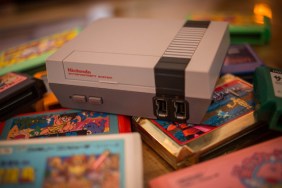4: Nintendo 64 vs. Sony PlayStation

The Rivalry
Nintendo’s first foray into 3D gaming was also the first time they were met with competition from Sony, the plucky up-and-comer in the console market that had the insane idea to put console games on discs.
While Sega was off twiddling its thumbs with the Saturn, Sony took up the mantle of the video game console for the Nintendo fan’s older brother.
While Nintendo stick lovingly clung onto cartridges, the PlayStation burst onto the scene with a little grey box that, at the time, could seemingly do everything. It had a line-up of games targeted towards a more mature audience, its CD functionality made it much easier to develop for and it could play music CDs. That was revolutionary at the time.

Needless to say, while Sega was off twiddling its thumbs with the Saturn, Sony took up the mantle of the video game console for the Nintendo fan’s older brother – if they could have ran with a “PlayStation Does What Nintendon’t” ad campaign, they would’ve done it.
Bolstered by the aforementioned ease with which developers could create titles for the console, the PlayStation lured many a third-party developer to its cause, leaving Nintendo in the familiar position of relying upon first-party titles to drive sales. With the likes of The Legend of Zelda: Ocarina of Time they certainly achieved this, though the PlayStation’s rich library of consistent releases worked in Sony’s favor.

Ultimately, the question of which console was better was down to personal taste. The Nintendo 64 didn’t have as many frequent releases as the PlayStation, though it was host to the likes of the aforementioned Ocarina of Time, Super Mario 64, Majora’s Mask and GoldenEye, while the PlayStation had a much greater flow of games that included Metal Gear Solid and Tomb Raider. The PlayStation would go on to outsell the N64 after staying on store shelves a whole three years after Nintendo’s console, with the N64 being discontinued in 2003 with around 33 million units in sold and the PS retiring in 2006 after selling over 102 million units.
The Winner
PlayStation bested the Nintendo 64 in terms of sales and longevity, though the N64’s most high-profile games continue to linger in the memory. However, Sony propelled the gaming industry into a whole new era with the PlayStation, with disc-based games becoming the norm and a new, older demographic being forged. As such, the PlayStation is looked upon as the most influential console of the two, and takes the grand prize here.
3: Wii vs. PlayStation 3 vs. Xbox 360

The Rivalry
The last console generation was arguably the greatest in the history of the gaming industry. With a stronger emphasis placed upon online play, a range of both diverse and blockbuster titles and the uprising of indie developers, the Xbox 360, PlayStation 3 and Wii are regarded as three of the greatest consoles of all time.
Each console was so good that we were the real winners here.
By now the sales figures of that generation are common knowledge. The Wii advanced beyond its position as the plucky underdog and went on to insert itself into homes worldwide, with Nintendo pushing the most hardware sales. Next came the Xbox 360, with its improved Xbox Live service proving to be a major boon for Microsoft as the likes of Call of Duty and Gears of War had people who had never even considered playing games over the internet suddenly signing up to Gold memberships. Finally there was the PS3, which struggled to maintain its footing initially due to an absurdly high price point and notably lacking online features, though eventually carved out a comfortable position for itself with a wide selection of truly classic games.

The thing that made the last console generation great, though, was that there was no runaway leader when it came to the quality of the titles being produced. While the Xbox 360 initially succeeded in bringing online multiplayer to the masses and had a library of games that complemented this, the PS3 was steadily raising its game in terms of must-have exclusive titles ranging from the Uncharted series, to LittleBigPlanet, to its eventual swansong The Last of Us. Meanwhile, the Wii was serving as a supplement to these two consoles, with a great game such as Super Mario Galaxy appearing every now and again that would remind you why you fell in love with the budget console in the first place.

Ultimately, the Wii had the most successful launch, the Xbox 360 enjoyed a healthy reign as the go-to console following the release of Gears of War in 2006, and then Sony pushed hard enough to nudge its way back into the game that it opened the floodgates to a sea of fantastic games, enjoying great success in its final years as Microsoft sat back and counted the dollars from the annual Call of Duty releases.
The Winner
Us. Yes, this may sound like a cop-out, but the last console generation was so good that it would do a disservice to the consoles to rank them ahead of each other. While there was a clear winner in terms of hardware sales, each system was so good that we were the real winners here. Go us.
2: Nintendo vs. Sega

The Rivalry
The hardware rivalry that spawned the term “console war,” the heated battle between Nintendo and Sega during the reign of the Super Nintendo and Sega Genesis was something that divided playgrounds. Some kids liked the SNES, while other preferred the Genesis, and there was rarely a middle ground to be found.
This odd brand loyalty has followed the gaming industry into the current generation, where the same debates are being held by adults now. If it were not for Sega and Nintendo going at it, perhaps we could have all lived in peaceful harmony… though probably not. This period of time in gaming history was also home to some intense marketing tactics, the likes of which simply wouldn’t happen today.

Consider Sega’s “Genesis Does What Nintendon’t” ads, which were essentially a smear campaign on Nintendo professing that the SNES simply wasn’t up to scratch when compared with the Genesis’ power. Sega also invented the moniker “blast processing,” which frankly meant absolutely nothing, but it sounded good so Sega said that the Genesis utilized it.
The battle between Sega and Nintendo was initially waged between the NES and the Master System, with the NES comfortably trumping its rival with 62 million units compared to a lackluster 13 million. Then then the Genesis was released, Sega’s 16-bit console, which slayed the NES thanks to its (at the time) revolutionary visuals, which offered more than 4 color palettes and its library of more aesthetically impressive games. But when the SNES launched in the US with a copy of Super Mario World bundled in its box, Sega were forced to man their stations and begin firing on all cylinders.
Nintendo are struggling with the Wii U, but their fortunes are greater than Sega’s who are even struggling to make a good Sonic game these days.
Seven months following Super Mario World‘s release in Japan, Sega unveiled a mascot of their own: Sonic the Hedgehog. Billed as the more rad (rad was a word that was used back then) platforming hero, boasting incredible speed and a finger that he would rebelliously wag at the player from the title screen. The console war was in full swing, but now that war had faces, and one was blue and the other had a mustache.

Sega and Nintendo would continue duking it out until the former eventually began shooting itself in the foot, releasing a slew of hardware that all failed to resonate with the consumer. In 1992 came the Sega CD, an attachment for the Genesis that no one owned, in 1995 came the Sega Saturn, which despite pipping PlayStation to the post with its disc-based games fell well below the mark in terms of software, then finally the Dreamcast, an underrated console which failed to generate a lot of sales and eventually marked the end of Sega as a console manufacturer.
Meanwhile Nintendo was enjoying success with the Nintendo 64 and are still in the hardware market today, with Sega even producing games for them, something which our younger selves would have never believed would happen. Sonic has also appeared in a number of titles alongside Mario, including Super Smash Bros. Brawl and Olympic-themed mini-game collections.
The Winner
It was certainly fun while it lasted, but a number of poor business decisions ultimately led to the demise of Sega as a console manufacturer and therefore Nintendo wins this one with flying colors. While the company is currently struggling in the home console market with the Wii U, their fortunes are much better than Sega’s, who are finding it difficult to even make a good Sonic game these days.
<< Next Page: The #1 Rivalry >>







